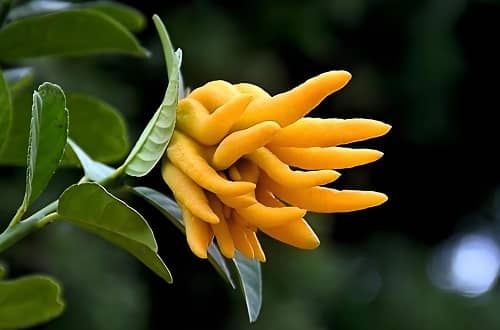Did you know that Buddha’s Hand, a common ingredient in traditional Chinese medicine, is actually a fruit rather than a vegetable? Many people mistakenly confuse it with chayote (Buddha’s Hand gourd), but these two are completely different plants. Buddha’s Hand (Citrus medica var. sarcodactylis) belongs to the Rutaceae family, while chayote belongs to the Cucurbitaceae family.

Table of Contents
- Introduction to Buddha’s Hand
- Medicinal Properties and Benefits
- Common Uses of Buddha’s Hand
- How to Use Buddha’s Hand
- Precautions and Contraindications
1. Introduction to Buddha’s Hand
Also known as Fingered Citron, Five-Fingered Orange, or Fragrant Citron, Buddha’s Hand is a fruit mainly valued for its aromatic fragrance rather than for direct consumption.
- Color Change: Green when unripe, turning golden yellow as it matures.
- Unique Shape: The fruit’s outer skin separates as it grows, forming elongated, slightly curved segments that resemble fingers—hence the name Buddha’s Hand.
- Main Uses: Due to its pleasant scent and decorative appeal, it is commonly used as a fragrant air freshener, ornamental fruit, and herbal medicine rather than as an edible fruit.
2. Medicinal Properties and Benefits
In traditional Chinese medicine, Buddha’s Hand is harvested when the fruit is still partially green or just beginning to turn yellow, as this is when its medicinal properties are strongest.
- Nature & Taste: Warm in nature, with a pungent and slightly bitter taste.
- Meridian Channels: Enters the Liver, Spleen, Stomach, and Lung meridians.
- Key Benefits:
- Relieves Liver Qi Stagnation – Helps ease chest and rib discomfort caused by stress.
- Regulates Qi and Aids Digestion – Alleviates bloating, stomach pain, and indigestion.
- Dries Dampness and Clears Phlegm – Beneficial for chronic cough with phlegm and chest congestion.
3. Common Uses of Buddha’s Hand
1. Traditional Medicine
Buddha’s Hand is often used to treat Liver Qi stagnation, digestive issues, and respiratory conditions such as:
- Liver Qi stagnation – Helps relieve symptoms like chest tightness, abdominal bloating, and poor appetite.
- Indigestion relief – Promotes gastric motility and alleviates stomach pain and bloating.
- Cough relief – Helps reduce excess phlegm and ease chronic coughs.
2. Ornamental Decoration
Due to its unique finger-like shape and bright golden color, Buddha’s Hand is widely used as a decorative fruit, symbolizing good fortune and blessings.
3. Natural Air Freshener
Buddha’s Hand emits a strong, pleasant fragrance, making it an excellent natural air freshener for homes, cars, and offices. Its scent is believed to reduce stress and promote relaxation.
4. How to Use Buddha’s Hand
Buddha’s Hand can be used in various ways:
- Herbal Tea – Sliced Buddha’s Hand can be brewed with dried tangerine peel and licorice root to aid digestion and relieve bloating.
- Decoction – Boiled with ginger and red dates, it helps alleviate Liver Qi stagnation and stomach discomfort.
- Aromatherapy – Dried Buddha’s Hand can be placed in rooms, wardrobes, or cars to freshen the air and reduce stress.
5. Precautions and Contraindications
Although Buddha’s Hand has many benefits, it is important to use it correctly:
❌ Not suitable for people with Yin deficiency – Its warming nature may worsen symptoms such as dry mouth, heat intolerance, and night sweats.
❌ Use with caution during pregnancy – As it regulates Qi flow, pregnant women should consult a doctor before using it.
❌ Avoid excessive consumption – Overuse may cause dryness or discomfort due to its warm nature.
Conclusion
Buddha’s Hand is more than just an exotic fruit—it is a powerful herbal remedy in traditional Chinese medicine with benefits such as relieving stress, aiding digestion, and reducing phlegm. It is widely used as an ornamental decoration, natural air freshener, and medicinal ingredient. However, it should be used in moderation and with caution, especially for those with Yin deficiency or during pregnancy.